Use this detailed guide to learn about TRT for veterans and where to find effective treatment opportunities.
Low testosterone, or low T, affects millions of American men. However, the solutions available to help overcome symptoms associated with low T are not commonly known or understood. Testosterone replacement therapy (TRT) has been incredibly beneficial in helping those with testosterone deficiencies recover and increase their testosterone levels.
One group in particular that suffers from insufficient testosterone (hypogonadism) is military veterans. If you are a veteran, it’s important to recognize the signs and symptoms of low T and how you can get the help you need.
We’ve put together a guide to TRT for veterans to explain the essential information regarding testosterone deficiencies and how testosterone replacement therapy can help. We are here to answer your questions and highlight some of the ways you may be able to identify low T symptoms. Read on to learn more about TRT for veterans.
While testosterone replacement for men is fairly common, the number of veterans who experience testosterone-related issues is higher than the general population. As a result, TRT for veterans helps them avoid prolonged symptoms.
The primary reason more veterans may require testosterone therapy compared to men who did not serve in the military is the impact that training and deployment have on the body. The conditions many veterans undergo while in the military can lead to significant declines in testosterone.
A study on testosterone concentration in U.S. Army Rangers found that a single night of nocturnal training had the potential to reduce testosterone concentration by 25-30%.1 Over time, the combined factors (such as stress, anxiety, and trauma) cause the body to produce less and less testosterone, which ultimately leads to a net loss of testosterone in veterans.
Veterans returning home from combat are more prone to experiencing:
According to the U.S. Department of Veteran Affairs, an average of 1 in 3 women and 1 in 50 men report having encountered MST during their time of service, a number that is hypothesized to not even account for the many who are too afraid of stigma to speak up on behalf of their assault.
Research has shown that low levels of serum testosterone have been a direct result of psychological and physical stress, such as military sexual trauma. In response to social-evaluative stress, testosterone concentrations have been found to decrease by 30% in women and 15% in men.4 In more stressful scenarios, it is likely that greater declines in testosterone concentration will occur.5
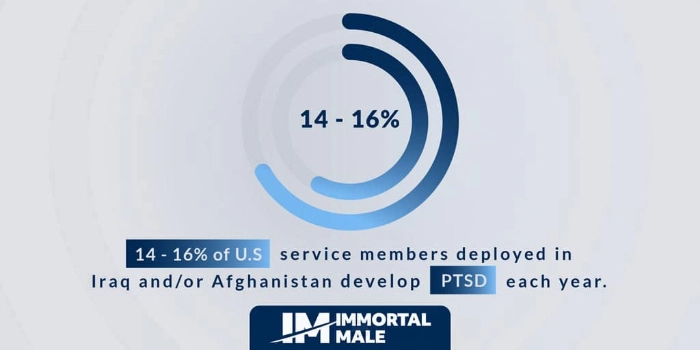
Those who serve in the military are exposed to a variety of experiences that leave them at higher rates of developing PTSD than civilians. In Operations Iraqi Freedom (OIF) and Enduring Freedom (OEF), about 11-20% of those who served in those operations experience(d) PTSD.6
Further research unveiled that approximately 14-16% of U.S. service members deployed in Iraq and/or Afghanistan also developed PTSD or depression.7
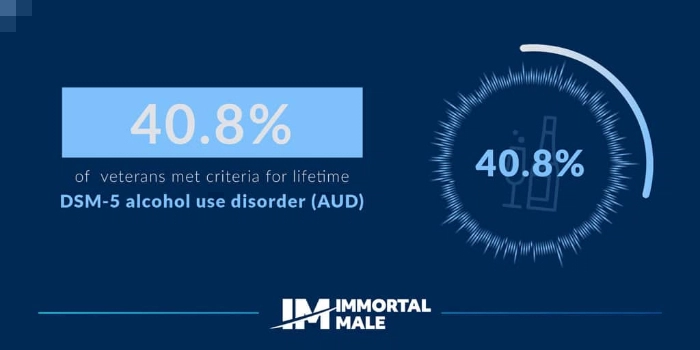
Due to the high levels of stress that are induced during combat, veterans are at higher risk of developing stress or anxiety disorders. Prolonged exposure to both stress and anxiety are risk factors for low testosterone.
Testosterone is a hormone that helps regulate sexual reproduction (e.g., penis and testes development, sperm production, libido) as well as other parts of the body such as body hair, muscle, and bone development. In men, testosterone is produced in the testes and plays a significant role in a man’s body as the primary sex hormone.
Unfortunately, after hitting peak production during puberty, testosterone levels begin to drop 1% to 2% each year.10
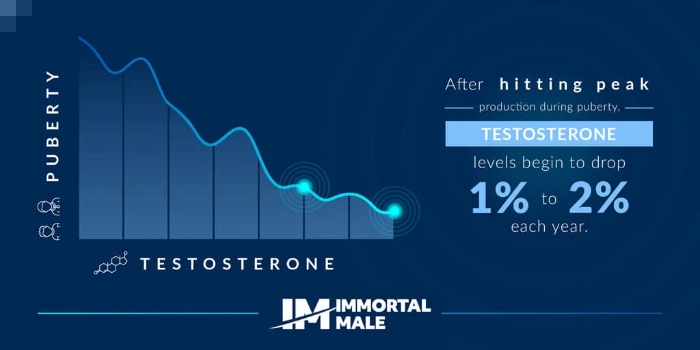
Below includes some of the most common causes of low testosterone levels from most to least common:
As aforementioned, veterans are at higher risk of developing stress and anxiety-related disorders, PTSD, TBIs, and AUDs. Additionally, veterans are likely to be prescribed medications such as corticosteroids for pain management often occurring from combat injuries.
Further, veterans are at higher risk of sustaining testicular infection or injury, such as blunt scrotal trauma, than civilians.11
Both mental and physical signs and symptoms can occur in veterans with low T. These are listed below.
Mental signs and symptoms of low testosterone include:
Physical signs and symptoms of low testosterone include:
Unfortunately, many of these symptoms often go untreated or are misdiagnosed as another type of illness. Furthermore, the VA does not regularly test for low testosterone, so it can be challenging to determine if declining testosterone levels cause these symptoms. However, proper TRT for veterans can help improve these issues.
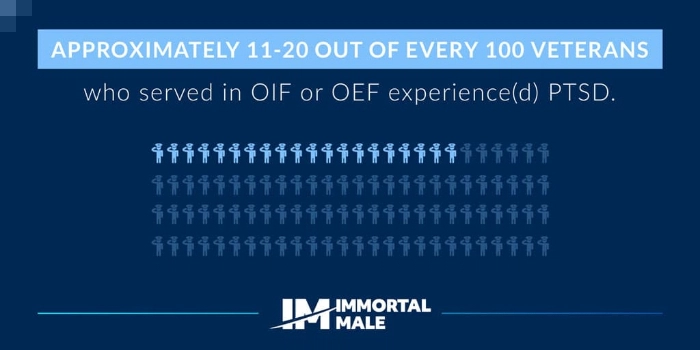
Anxiety is caused by stress and increased cortisol in the brain. As the brain reacts to stress, it begins to produce more cortisol. While mild stress can be beneficial, prolonged and extreme stress can cause dramatic increases in cortisol production, thereby lowering testosterone production. As cortisol production increases, testosterone production decreases.13
Due to the nature and responsibilities of those in the armed forces, veterans encounter stressful situations far more frequently than their average civilian counterpart.
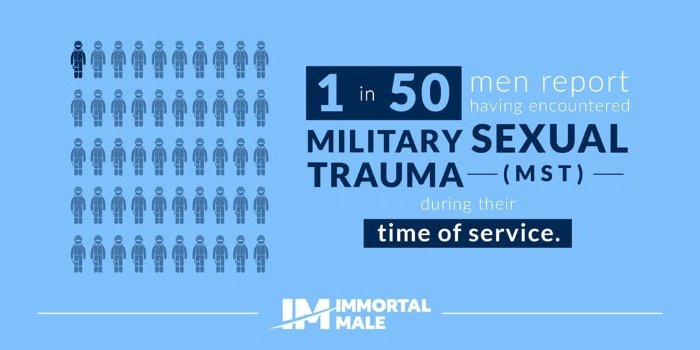
Hypogonadism is associated with depressive symptoms in men.14 In the veteran population, about 15% of members are diagnosed with depression without considering contributing factors.15 Veterans who are experiencing symptoms of low testosterone and who are also seeking relief from depression should speak with a medical professional to determine if hypogonadism is causing their depressive symptoms.
The prevalence of low testosterone is higher among men with traumatic brain injuries (TBI) and those with PTSD. In a study of testosterone levels in patients following moderate and severe TBIs, 80% of the men experienced low serum testosterone levels within the month following the TBI event.16 The association is further supported by a study evaluating football players following a concussion, in which 18.3% of the study participants experienced the indicators of low testosterone.17
Other trials have evaluated the relationship between PTSD and low testosterone. PTSD is not likely a cause of low testosterone, however, for veterans who have been diagnosed with low testosterone managing the symptoms of PTSD is increasingly difficult.18 Fortunately, current studies have suggested that testosterone treatment in TBI patients reduces the opportunity for continued neurodegeneration post-TBI.19
There are strong correlations between low testosterone and mental health, which is why TRT for veterans can be vital. Besides the physical effects that testosterone deficiencies in veterans can cause, there is a direct correlation between veterans with post-traumatic stress disorder (PTSD) and low testosterone.
Research shows that low serum testosterone levels in men are linked to greater anxiety and more irritable moods20 For veterans, these effects seem to be amplified by the extreme situations they find themselves in. The findings of one study suggest that low testosterone levels in soldiers before deployment can increase the likelihood of developing PTSD post-deployment.21
Yes, stress and anxiety can cause low testosterone in veterans. Evidence shows that psychological stress, such as elevated stress and anxiety, directly affects the amount of testosterone the brain produces in men.22
For veterans, this can be dangerous as testosterone regulates several different systems in the body and brain, potentially leading to severe consequences with prolonged low testosterone levels. As such, TRT for veterans can be essential to reduce stress levels and allow proper physical and mental health.
Anxiety and stress are closely linked to the body’s natural amount of testosterone. When testosterone levels are low, there is an increased risk for anxiety.23 Anxiety symptoms were also reported more frequently in men with low testosterone than in men with regulated levels of testosterone.24
One of the reasons this is so impactful for veterans is that most of the stress they suffer from is ongoing and long-term, sometimes going months or even years at a time under both high mental and physical stress. In a high-stress workplace, where low testosterone treatment is not always highly accessible, it is possible for many patients to go untreated for years. Untreated hypogonadism has been demonstrated to cause worsening health outcomes, such as diminished cognitive function, depression, and loss of muscle mass, as patients continue to go without care.25
Yes, low testosterone levels can lead to fatigue, which can manifest as extreme tiredness, particularly when overworked and stressed for long periods. The body, mind, and a person’s testosterone levels are interconnected in many ways, and the physical side effects can be equally as difficult as the mental ones.
These effects can greatly impact a person’s life, but TRT for veterans and other men can reduce these symptoms.
Low testosterone in the military is a common disorder affecting men in all branches, ranks, and positions. However, getting treatment through the Veterans Affairs (VA) can be difficult.
The VA can test for low testosterone as a lab test, but it is not a routine procedure because it is not typically related to injury or disease incurred while in service.
While the military can prescribe testosterone under certain conditions, such as injury to the genitals or hypogonadism, most veterans are not eligible for treatment. Between 2008 and 2012, the VA prescribed testosterone to only 162,092 men.27
Another primary reason the VA does not typically prescribe testosterone is because, according to many VA clinicians, the cause of low testosterone is due to comorbidity issues. One study within a VA region from 2002 to 2011 found that while the population of men with low testosterone increased from 35% to 47%, testosterone therapy decreased from 31% to 28%. Thus, rather than prescribing testosterone replacement therapy for veterans, they choose to identify and treat the subsequent conditions or symptoms.28
Treatment of the symptoms rather than hypogonadism itself is common. Indications of hypogonadism in men include:

Testosterone replacement therapy is a hormone therapy used to treat low testosterone levels, primarily in men. Hormone replacement therapy for men is less well-known than the options available for women, but low testosterone affects an increasing number of men yearly.
TRT is prescribed and monitored by trained physicians. The type of testosterone given and how it is administered may vary depending on each patient’s unique situation.
There are several options for hormone replacement therapy, and each application has its uses and benefits depending on the individual needs of the patient.
Here are some of the treatment types available for men with low testosterone:29
Testosterone replacement therapy is an effective treatment option for the symptoms of hypogonadism, as TRT for veterans provides the body with an external source of testosterone.
There are several evidence-based benefits of TRT for veterans, notably, restored libido, improved muscle mass and strength, and improved cognitive function. These benefits can drastically improve the lives of men who have been dealing with low testosterone and help them lead a more fulfilled life.31 In a survey of men taking TRT, 70% reported satisfaction with the TRT treatment process.32
Testosterone is one of the primary chemicals responsible for natural muscle growth and overall physical strength in men. When it declines, muscle mass also decreases, resulting in weakness. The National Library of Medicine reports that muscle mass decreases an average of 1.5-5% each year, with the rate of decline only worsening after 50, and furthermore, over 15% of strength is lost per decade after the age of 50.33 However, patients that have taken testosterone treatment therapy for six months experienced significant increases in muscle mass.34
With hormone replacement therapy, it is possible to increase muscle growth back to natural levels and improve strength simultaneously.
One of the main side effects of low testosterone in men is erectile dysfunction, a condition in which a man is unable to achieve or maintain an erection. This condition can affect men differently depending on their level of testosterone, but testosterone replacement therapy for men can also help to restore and improve sexual function.
Healthy testosterone levels can also regulate and improve sexual appetite, as increased testosterone often corresponds to restored libido.35
Low testosterone causes a number of physical side effects, most notably fatigue, erectile dysfunction, and decreased vitality.37 After 3-6 weeks of hormone replacement therapy for men, improvements to energy, erectile function, and vitality can be felt.38 Reduction of the symptoms of hypogonadism enables men to challenge themselves in other aspects of their life, be it sexually, mentally, emotionally, or physically.
One study found that 83,010 men with low testosterone that were treated with TRT had a reduced risk of stroke, myocardial infarction, and death.39
The combination of symptoms caused by low testosterone can take a toll on well-being and self-worth. Testosterone sparks feelings of dominance, competitiveness, and consequently, confidence.41 According to a study conducted by Harvard Business Review, the majority of men believe that maintaining a healthy level of competition can promote character development, productivity, and innovation. 36% of men surveyed stated that they’d prefer their bonus to be competitively inclined, based on the previous reasoning.42
When men are able to express themselves both creatively and competitively, their state of mind improves as a result.
TRT for veterans has been shown to decrease signs of anxiety and depression while improving cognitive flexibility and the ability to handle stress.
In a study conducted of 1890 men, it was concluded that testosterone treatment significantly reduced depressive symptoms, especially in the men who received higher doses.43
Testosterone replacement therapy enables individuals to live fulfilling lives without the burdens of hypogonadism or other symptoms associated with low testosterone levels. For those with low testosterone – especially in cases where low testosterone results from a veteran-related injury or type of mental strain – the symptoms can feel all-encompassing and overwhelming to handle, especially if they have just come back from active duty.
TRT for veterans and other groups of men can help increase libido, treat erectile dysfunction, and decrease fatigue all while also working to increase energy levels and the ability to achieve and maintain muscle mass. It can even help to facilitate body hair growth, improve concentration, and combat anxiety or depression, low self-worth, and irritability, all of which are symptomatic of low testosterone.
Utilizing testosterone replacement therapy to help treat any of these symptoms can help veterans get back on their feet and deal with any adverse side effects that combat or service might have created or exacerbated.
Testosterone production decreases naturally over time, at an average rate of 1.6% per year while free and bioavailable levels fall by 2%–3% per year in men.44
This means the duration of testosterone replacement therapy is indefinite. As a result, it is recommended to continue testosterone treatment as long as your doctor recommends it. If you are considering stopping testosterone treatments, talk with your doctor first to avoid possible side effects.
You can expect to check in with your doctor at the three- and six-month marks once you start hormone therapy. After the initial check-ups, you will need to visit your doctor annually to ensure the testosterone treatment is still working. If not, the doctor will need to make adjustments to your prescribed dosage. Some other things that the doctor will look into include:
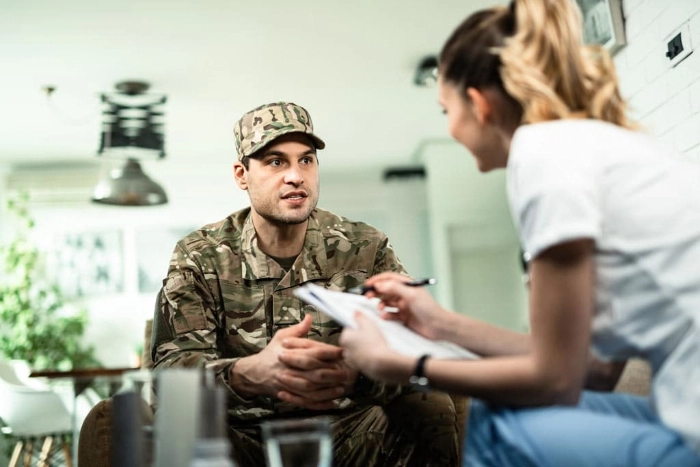
If you are a man suffering from low testosterone, you don’t have to go through it alone. Immortal Male provides TRT for veterans and any other men suffering from hypogonadism, erectile dysfunction, and other causes of low testosterone. You can speak to a member of our team today to learn more about TRT for veterans.
We utilize the information gathered from a short online form, personal conversations, and the data collected via the At-Home Test Kit to create a personalized bioidentical testosterone prescription. Our team of physicians is here to help you live a happier, healthier, and longer life.
If you’re interested in learning more about TRT for veterans, reach out to a professional at Immortal Male today to discuss if this is a suitable path for you. Even if the VA doesn’t cover your testosterone replacement therapy, you may still have options to get the treatment you need.
We are happy to answer your questions and give you more information about testosterone treatment options so you can make the appropriate decisions regarding your health.
Immortal Male is an online clinic that helps men optimize their hormones.
As part of your membership and as medically indicated, physicians prescribe medications, and recommend supplements that are delivered to you from the comfort of your home.